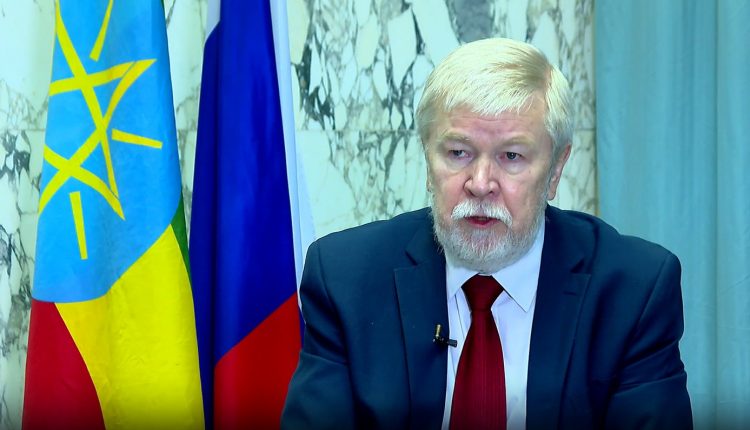Russian Ambassador: BRICS membership boosting Ethiopia’s economic growth and global influence
Addis Ababa, May 9, 2025 (FMC) – Ethiopia’s accession to the BRICS platform is providing a major boost to the country’s economic growth and international stature, according to the Russian Ambassador to Ethiopia, Evgeny Terekhin.
Ambassador Terekhin stated that BRICS membership is opening vital channels for development financing, technical expertise, and expanded market opportunities. He emphasized that the bloc “provides Ethiopia with access to important mechanisms for economic development and international cooperation.”
Beyond economic benefits, the ambassador highlighted Ethiopia’s enhanced role in global political affairs, noting that BRICS offers a platform for advocating reforms in international governance and promoting development models that reflect diverse national characteristics.
Commenting on bilateral ties, Ambassador Terekhin said Ethiopia’s membership in BRICS has significantly strengthened economic cooperation between the two nations. He told ENA that Ethiopia’s longstanding leadership in championing African interests aligns with Russia’s efforts to promote a fairer international system. This shared vision enables the two countries to advance mutual priorities and address joint challenges, such as climate change and trade barriers, within the BRICS framework.
Russia’s experience in BRICS has positioned it to assist Ethiopia in maximizing the benefits of its participation. This includes support for involvement in business forums, financial cooperation initiatives, and policy coordination mechanisms.
Ambassador Terekhin also outlined the growing economic ties between Russia and Ethiopia, describing them as a reflection of strong mutual business interest.
He revealed that the Russian Trade Representation in Addis Ababa has been receiving “multiple inquiries from companies eager to explore opportunities in the Ethiopian market.”
He said Russian and Ethiopian businesses are collaborating across a broad range of sectors, including automotive manufacturing, energy development, electrical equipment, chemical production, food processing, pharmaceutical research, transportation systems, and digital technologies. Agriculture, he noted, remains “particularly important, considering its central role in Ethiopia’s economy.”
To support these efforts, the Russian Embassy and trade representatives are actively working to address challenges and create favorable conditions for business development, he added.
Reflecting on past cooperation, the ambassador recalled that between the 1970s and 1990s, the Soviet Union supported the implementation of 43 major projects in Ethiopia, such as the tractor assembly plant in Adama and the Melka-Wakana Hydropower Plant. He said this legacy provides a strong foundation for renewed and future collaboration.
Ambassador Terekhin also pointed to Ethiopia’s Special Economic Zones (SEZs) as “promising opportunities for Russian businesses looking to establish or expand their presence in Africa.” These zones, he noted, offer benefits such as streamlined one-stop-shop services, tax and customs incentives, and ready infrastructure.
He concluded by expressing confidence that Russian companies are “well-positioned to participate in these initiatives and use Ethiopia as a gateway to the broader African market.”

